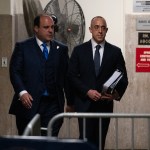It’s all over but the arguing. In a few days, Gen. Petraeus will be back at Camp Victory and Amb. Crocker will be back in the Green Zone. The next comprehensive official assessment of Iraq’s political and military fortunes will come in March 2008, when Petraeus will decide when and if to schedule further reductions below the pre-surge force of roughly 130,000 troops.
But, until then, what information are we still missing, despite the last two days’ worth of testimony? Here are a few of what Donald Rumsfeld used to call the “known unknowns.”
Stastical Methodology. Forgive us for harping on this point, but at least twice yesterday, Senators noted to Petraeus that his figures for determining the status of security in Iraq are under question, only to decline to pursue any answers. By some estimates, Iraq in 2007 is more deadly for civilians than Iraq in 2006. Similarly, the U.S. Government Accountability Office, following on concerns from both the CIA and the DIA, said last week that it can’t determine that sectarian killings are in fact on the decline. Petraeus referred today to his command’s “pretty logical and rational” methdology, and said on Monday that the tabulation has remained consistent since before he took over the command. But though he hinted at it today, he didn’t discuss how his command tabulates sectarian killings; whether his command relies on the Iraqi government for its total of civilian casualties; or if they revise its total of “insurgent” deaths after an engagement when eyewitnesses claim civilians were killed.
Provincial Handovers vs. Troop Reductions. On Monday, Petraeus revealed that there’s a standing Iraq-U.S. committee that develops schedules for turning over security responsibilities to the Iraqi security forces. While the timetable itself is probably classified, Petraeus did say that he’s looking to January 2008 to turn over Anbar, and that the southeastern Maysan province may soon follow. But what’s unclear is how the turnover impacts U.S. troop reductions or movements.
Provincial vs. National Politics. This might be the biggest unknown of all. Crocker defined his long-described “bottom-up” reconciliation as a process where Sunni provinces tie back into the Shiite-Kurdish central government. According to Crocker, itâs a clear sign of progress if, for instance, the Sunni Anbar province takes reconstruction money from the government. But it’s entirely unclear why Sunnis wouldn’t be happy to take that money even as the Sunnis consider Maliki’s government illegitimate. Money is money, after all.





 Petraeus/Crocker Wrap Up: The Known Unknowns
Petraeus/Crocker Wrap Up: The Known Unknowns


